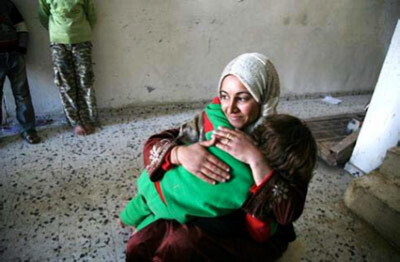Palestinian Center for Human Rights 10 February 2009

Faten, holding her young daughter Nagham, in their home in Rafah. (Malian)
Foreign correspondents and camera crews have now begun to leave Gaza, in search of the next headline-grabbing location. But ongoing air strikes and violations of international law are a stark reminder that there is no real end to Israel’s offensive here.
Since Israel declared a unilateral ceasefire on 18 January it has continued to launch strikes against targets in the Gaza Strip. Some families in the southern town of Rafah have been evacuated from their homes up to 10 times in the last 15 days.
Faten al-Shaer, a 31-year-old mother of one, lives just 150 meters from Gaza’s southern border with Egypt. This area, known as the Philadelphi Route has been repeatedly targeted and is now a mass of rubble, sand and bomb craters. Her home is one of the few left standing here, surrounded by the grey concrete remains of homes, and the shreds of tarpaulin that once covered smuggling tunnels.
“I was baking bread when the bombing of the border area began on 28 December,” says Faten. “Thousands of people took to the streets, trying to escape. Everybody was on the move. My mother, my five-year-old daughter Nagham and I ran to my uncle’s house, which is further from the border.” Other family members were scattered at the homes of relatives.
“During the war there was daily bombing of this area — sometimes in the morning, sometimes at midnight,” says Faten. “It went on for 22 days. When the ceasefire was declared we came back to the house but had to evacuate it again the next day because they started bombing again.”
Faten and the 35 members of her extended family have still not spent the night at their home. They come back during the day but always leave before darkness falls.
“The children are suffering real trauma,” Faten adds, as her green-eyed daughter Nagham clings to her. “Some of them are incontinent and they wake up in the night and start crying. My daughter Nagham has to hold onto me all the time. They understand it’s a war.”
The impact of the air strikes and incursions on the children of the Gaza Strip has been acute. Faten’s seven-year-old nephew Dia was in school a few days ago, when he heard an unmanned Israeli drone in the sky. He automatically picked up his schoolbag and ran home, crying “The drones are still over my head. I can’t take it anymore.”
Gaza’s 1.5 million people are still being denied their rights to appropriate living conditions and humanitarian aid is still not reaching many people in need. Families like Faten’s who are not registered as refugees have not received any aid at all.
One of their only sources of income — a small patch of land where Faten’s brother grew vegetables — was bulldozed by the Israeli military a few years ago. Since then they have had to rely on help from relatives in an already beleaguered community. Border closures imposed by Israel since June 2007, have steadily tightened and continue to have a disastrous impact on the economy.
“The international community should intervene,” says Faten. “I just hope they can reach some sort of solution. If the borders were opened for food and fuel then we wouldn’t need the tunnels. It is Israel’s closure policy that has created a need for the tunnels.”
The Israeli-imposed siege has also resulted in a steady deterioration of health conditions. There are chronic shortages of vital medicines and hospital facilities that rely on electricity have been adversely affected by the lack of fuel to power generators.
The psychological cost of the air strikes cannot be underestimated. The bombs that Israeli warplanes are still dropping on Rafah and other parts of Gaza cause huge explosions and earth tremors and lead to sustained feelings of panic and fear among local residents, especially the elderly and children. Civilians often receive automated telephone messages before attacks, urging them to evacuate their houses near the border. But Gaza is densely populated and civilian structures including schools and hospitals sheltering displaced people, have been attacked. People feel there are no safe places left.
The Palestinian Centre for Human Rights is calling upon the High Contracting Parties to the Fourth Geneva Convention to take effective steps to ensure Israel’s respect of the Convention in the Occupied Palestinian Territories and to provide immediate protection for civilians like Faten and her family.
“We never feel safe,” adds Faten. “We know Israel will bomb again. We just hope there will be a proper ceasefire so we can come back to our homes and start to rebuild what is left.”
This report is part of the Palestinian Centre for Human Rights’ series “Aftermath” that looks at the aftermath of Israel’s 22-day offensive on the Gaza Strip, and the ongoing impact it is having on the civilian population.
Related Links